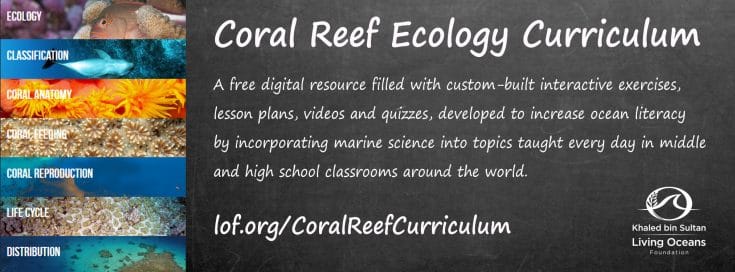The Khaled bin Sultan Living Oceans Foundation is proud to announce that our Coral Reef Education Portal won the 2016 W3 Award for Environmental Awareness. Receiving nearly 5,000 entries, the W3 Award honors outstanding websites, web marketing, web video, mobile sites, apps & social content created by some of the best interactive agencies, designers, and creators worldwide. We are honored to win such a prestigious award.

We encourage you to dive into our Education Portal to learn more about coral reefs. This custom-built online platform contains a comprehensive Coral Reef Ecology Curriculum complete with lesson plans, quizzes, educational videos, interactives, and games designed to educate people about life on coral reefs. This educational resource is free to anyone with an internet connection. You can even create an account to keep track of your progress, record your scores on quizzes, earn badges, and learn at your own pace.
We designed the Coral Reef Education Portal for students and teachers, but it is a useful teaching tool for anyone interested in learning about coral reefs. The Portal brings 21st century coral reef education into the classroom and promises to be a great resource for high school science teachers. Teachers can download worksheets, get ideas for fun and instructive classroom activities, and track the progress of each of the students in their class.
All of the lesson plans and classroom exercises are aligned to the U.S. Common Core State Standards (CCSS) as well as the Next Generation Science Standards (NGSS) and the Ocean Literacy Essential Principles and Fundamental Concepts (OL), and can be integrated into a variety of STEAM courses including biology, chemistry, art, and math. The curriculum covers a wide variety of topics – most of the lesson plans in the curriculum use coral reefs as an example to teach broad themes relating to the natural world and our environment.
With the gracious support of Prince Khaled bin Sultan, we have developed 11 units of the Coral Reef Ecology Curriculum on topics including coral anatomy, classification, ecology, growth, reproduction, and zonation, and we are already working on creating 12 more units.

